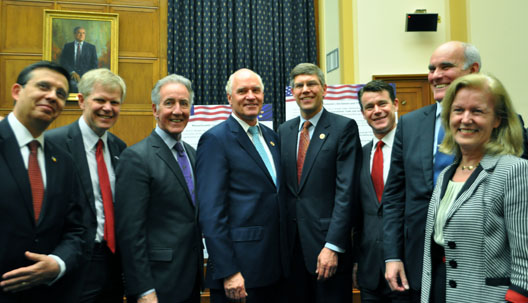 The Atlantic Council, Bertelsmann Foundation, and the British Embassy in Washington, and the German Marshall Fund hosted a reception on Capitol Hill on Thursday, April 3rd, 2014 to honor the new Transatlantic Trade and Investment Partnership Caucus. The bipartisan caucus, chaired by Congressman Bill Keating (D-MA), Congressman Richard Neal (D-MA), Congressman Erik Paulsen (R-MN), and Congressman Todd Young (R-IN), brought together key stakeholders in both the United States and European Union to discuss the benefits of TTIP. The event also highlighted the findings of TTIP and the Fifty States: Jobs and Growth from Coast to Coast, a report produced by the co-partnering organizations. The report highlights the potential increase in exports and job growth resulting from the negotiation of a successful TTIP agreement for each US State, over 70 congressional districts, and key American economic sectors.
The Atlantic Council, Bertelsmann Foundation, and the British Embassy in Washington, and the German Marshall Fund hosted a reception on Capitol Hill on Thursday, April 3rd, 2014 to honor the new Transatlantic Trade and Investment Partnership Caucus. The bipartisan caucus, chaired by Congressman Bill Keating (D-MA), Congressman Richard Neal (D-MA), Congressman Erik Paulsen (R-MN), and Congressman Todd Young (R-IN), brought together key stakeholders in both the United States and European Union to discuss the benefits of TTIP. The event also highlighted the findings of TTIP and the Fifty States: Jobs and Growth from Coast to Coast, a report produced by the co-partnering organizations. The report highlights the potential increase in exports and job growth resulting from the negotiation of a successful TTIP agreement for each US State, over 70 congressional districts, and key American economic sectors.
Fresh from a visit to Kansas and Missouri, European Ambassador to the United States João Vale de Almeida emphasized the strategic importance of successful TTIP negotiations, stating that “TTIP, Ukraine, and Russia are interlinked, and the success of TTIP is of vital importance to both the United States and the European Union.” Congressman Neal noted that a considerable amount of the world’s GDP is reliant upon trade between the United States and the European Union, and at least one-third of Massachusetts’ economy is trade related. Congressman Paulsen noted that his district will benefit from nearly 3,000 more jobs stemming from TTIP implementation. He expressed his confidence that the TTIP caucus membership would grow, particularly as TTIP’s benefits become more apparent. Congressman Keating explained that the state of Massachusetts will see a 28 percent increase in exports if TTIP is implemented. He reminded the audience that TTIP is not just about trade; the agreement is about shared values. “If negotiations are unsuccessful, a vacuum will be created that will surely be filled by emerging economies,” Keating asserted.
Congressman Young reiterated Ambassador Vale de Almeida’s statements about the link between security and the economy. “Trade is not a zero-sum game,” he said; “instead, everyone has the propensity to benefit…We need to share that story with constituents,” he said. Finally, Deputy US Trade Representative Michael Punke noted that the economic benefits of a TTIP agreement are more obvious, yet the strategic significance of the agreement is much more pertinent. “Indeed, the agreement is an inflection point, and through TTIP, the US and EU might update the global economic architecture.” In sum, the speakers all agreed that concluding a comprehensive TTIP is an absolute necessity, both politically and strategically.
Image: H.E. Iulian Buga, Embassy of Romania; H.E. Björn Lyrvall, Embassy of Sweden; The Hon. Richard Neal, Congressman (D-MA); The Hon. Bill Keating, Congressman (D-MA); The Hon. Erik Paulsen, Congressman (R-MN); The Hon. Todd Young, Congressman (R-IN); H.E. João Vale de Almeida, Delegation of the EU to the US; and H.E. Anne Anderson, Embassy of Ireland (from left to right)
